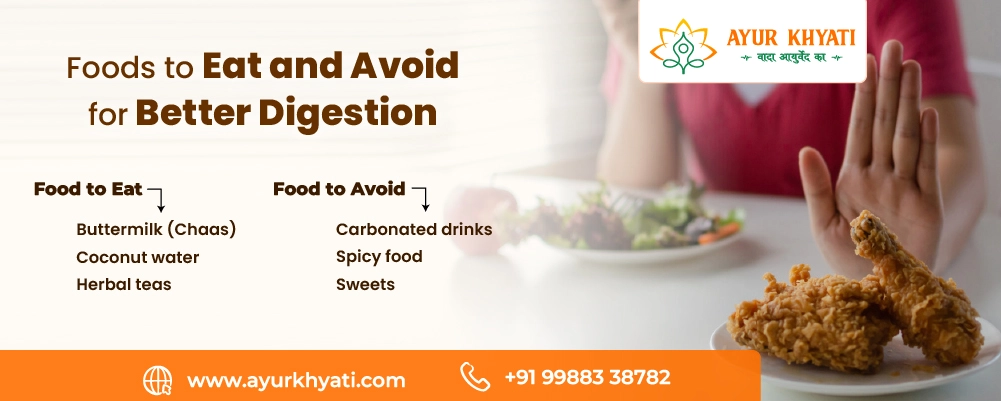Table of Contents
A recent research done by Ahmedabad-based Noble Gastro Hospital revealed the high rate of gastric reflux in Gujarat, with statistics showing that between 30% and 40% of the state’s population suffers from acidity and heartburn.

Why Is Acidity Common in Gujarati Cuisine?
- Spicy snacks & Fried Foods: Gujarati snacks are generally deep-fried and spicy. For example: Fafda, Dhokla, Kachori and Bhajiya. They can cause acid reflux and irritate the stomach wall.
- Sweets: Gujarati’s every meal ends with having sweets. Each meal contains a touch of sweetness, such as shrikhand or jalebi. Excessive sugar can impede digestion and cause bloating and acidity.
- Late dinners: Late dinners will not get enough to digest properly. When we consume heavy meals before bedtime,it increases acid reflux in the body.
- Overeating: In Gujarati homes, Whether it’s a wedding, festival, or a casual gathering, there’s always a buffet of delectable delicious foods. Lots of delicious food means overeating. It causes Slow digestion, excessive acid build up, bloating and gas.
How Ayurveda Sees Acidity and Digestive Problems
1. Role of Pitta dosha: Ayurveda says, Pitta is the dosha in the body that regulates digestion, metabolism, and transformation. It contains both fire and water. If you eat too much spicy or fried food, pitta gets aggravated. It generates excessive heat in the stomach which results in Heartburn, Acidity and irritation in the stomach.
2. Ama (toxins) buildup: Ama or toxins is sticky, poisonous residue left over when the food is not properly digested. It blocks your digestive routes and reduces the agni (digestive fire).
Signs of Ama:
- Bloating
- Bad breath
- Low energy level
- Poor appetite
Top Ayurvedic Remedies for Acidity & Indigestion
You don’t have to give up your favorite Gujarati foods. Try these acidity problem remedies that naturally relax your stomach, enhance digestion and reduce acidity.
1. Jeera + Saunf water
Ingredients:
- 1 tsp jeera (Cumin seeds)
- 1 tsp saunf (Fennel)
- 2 cups of water
How to make : Boil jeera and saunf in 2 cups of water. Let it boil on low flame for 5 minutes. After 5 minutes, strain this water and sip warm.
Benefits: It reduces bloating and helps in digestion after heavy meals.
2. Amla juice in the morning
Take 1-2 tablespoons of Amla juice on an empty stomach in the morning.
Benefits: It helps in balancing Pitta and improves digestion over time.
3. Buttermilk with roasted cumin
Take a glass of buttermilk and sprinkle roasted cumin (jeera) powder and add rock salt. Drink this with your meal.
Benefits: This relaxing drink cools the belly, promotes digestion, and lowers acidity.
4. Trikatu Churna for digestion
It is a herbal mix of black pepper, long pepper and dried ginger. Take ½ tsp with honey or warm water before meals.
Benefits: It improves digestion and decreases ama.
5. Herbal teas after meals
- Fennel Tea: Boil 1 tsp fennel seeds in 2 cups of water for 5 minutes. Strain and sip warm. It cools down your pitta and reduces bloating.
- Ajwain Ginger Tea: Boil ½ tsp ajwain (carom seeds) and ½ tsp fresh grated ginger in 2 cups of water. Strain and sip. It helps in digestion and relieves stomach cramps.
Daily Routine to Avoid Acidity for Food Lovers
1. Meal timings: Eat your meals at the same time each day. The body’s digestive fire (agni) is most powerful:
- Have breakfast within 1 hour of waking up.
- Have lunch between 12-1 PM.
- Have your dinner before 8 p.m.
2. Chewing habits: Do not eat your meal too quickly. Chew each meal mindfully to combine saliva and break down the food.
3. Mid-day meals vs late-night snacks: Always choose mid-day meals over late night snacks. Here are the reasons:
- Our digestive fire is highly active between 12 PM and 2 PM.
- Mid day is the best time to eat your heaviest meal.
- Your body is more busy throughout the day, so food digests and converts into energy more quickly.

Foods to Eat and Avoid for Better Digestion
1. Food to eat:
- Light moong dal khichdi
- Buttermilk (Chaas)
- Steamed veggies like Bottle gourd, spinach, pumpkin etc.
- Coconut water
- Herbal teas
2. Food to avoid:
- Deep fried food like Bhajiya, samosa or other heavy oily foods.
- Sweets
- Spicy food like Dhokla
- Carbonated drinks
Conclusion
Gujarati culture represents kindness, heritage, and delicious food. Whereas Gujarati meals are full of flavor but they might occasionally be too much for our stomachs. Ayurveda does not tell us to give up on our favorite foods. It teaches us how to enjoy them more intelligently.
You may enjoy your favorite dishes and prevent food acidity by following home remedies for bloating and making little changes such as eating on time and taking herbal teas.
“Acidity and gas are common after Gujarati meals. This Ayurvedic guide offers effective, natural remedies to soothe your stomach and enjoy your food without worry.”
Want a Quick Guide to Manage Acidity Naturally? Contact us to receive your free Ayurvedic digestion tips checklist!